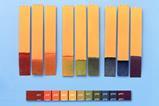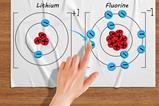Kristy Turner looks at how to help students improve their core chemistry skills

Have you ever heard a student described as ‘weak’? Or do you know of a student being advised not to continue studying a subject because of the jump between GCSE and A-level?
Recently I undertook some training in character education for my pastoral role as a Year 13 tutor. As part of this we were encouraged to stop thinking that intelligence is fixed, or that the destinies of our students were predetermined by their GCSE attainment or a set of attributes they were born with. Instead, we were asked to think about what skills good students have and how those skills could be developed in those who don’t achieve as highly.
I wondered how this idea would look for chemistry students. So, I set about designing a chemistry-based ‘radar’ to help students rate their own skills. The student and I could use this to develop some targets beyond the usual ‘revise more’ or ‘do more past papers’.
1. Use the periodic table as the starting point for thinking
Expert chemists know that everything eventually leads back to the periodic table – novice chemists have yet to realise the huge role it plays, especially when approaching questions about unfamiliar substances. Suddenly faced with a question about neodymium students might complain, ‘But we haven’t been taught neodymium.’ The periodic table is able to help students predict bonding, reactivity, physical properties and more.
2. Visualise physical and chemical processes
The best chemists are able to visualise concepts that help them make sense of questions. They ‘see’ regions of high and low electron density and concepts such as gas pressure and collision theory related to the Maxwell–Boltzmann distribution and Arrhenius equation.
3. Switch between representations
One reason students struggle with chemistry is due to the many representations they have to navigate. An organic molecule may be referred to with its systematic name, its common name, its molecular or structural, skeletal or displayed formula. Diagrammatic formulae may be drawn flat on a page with unrealistic bond angles or with 3D perspective and realistic bond angles.
4. Manipulate mathematical equations
Ah, the maths thing … Frustrating for physical chemists as well as A-level teachers. Students tend to overestimate their skill in this area, especially if they are also studying A-level maths. They may be able to successfully rearrange quite advanced algebra when it is written with x, y and z in the formula, but it can be quite another thing when the components have accompanying orders of magnitude. Sequencing of calculations through the mole concept is also tricky, when to convert to moles (my answer: as soon as possible) and when to convert back.
5. Relate observable phenomena to underlying concepts
This skill can relate to practical work – what is seen, measured and carried out in the lab can be related back to chemical concepts. Colour changes, melting points, even the rationale for carrying out particular techniques in particular ways (eg recrystallisation using a minimum volume of solvent) can all be linked with chemical concepts.
6. ‘Chemical common sense’
A general feel for what substances look like and what their properties are. So when a student sees a precipitate from the reaction of sodium thiosulfate and acid they are able to identify sulfur as the likely cause when faced with the full equation (because they have a general idea that the other substances are soluble or that sulfur is insoluble).
7. Write logical explanations without repetition or contradiction
When faced with ten lines for an explanation, I know students who can fill them all and still not score highly. I just want to tell some students ‘stop writing now!’ because I know if left to their own devices they will write ‘intermolecular forces’ at the end of a perfectly good paragraph on ionic bonds. Other students are adept at writing the same thing, three times, with slightly different words.
I don’t think this list is exhaustive but I think it’s a good start, and seven skills isn’t overwhelming. I am currently having the coaching conversations with my students, helping them to decide suitable, achievable targets.
If you’d like to download my worksheet, it would be interesting to hear what you think the core skills are and how they may differ from those in physics or biology.
Downloads available for this article
Downloads
Seven skills to get an A worksheet
Word, Size 63 kbSeven skills to get an A worksheet
PDF, Size 0.1 mb














2 readers' comments